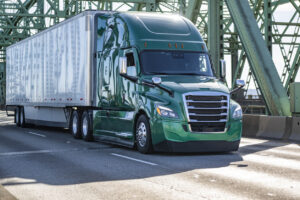There’s little doubt that driving a truck professionally can be a rewarding career. Compared to other career choices, the training can be less inexpensive and require much less time. Often, the training is employer-sponsored, meaning that new entrants to the profession can receive training for free.
It’s not unusual for a driver to make trucking a second career after retiring from the military, being laid off after a plant closure or simply tiring of his or her current job. Many drivers have transitioned to trucking with great success.
Look at the whole picture before jumping in.
Unfortunately, too many drivers and their families aren’t provided with the complete picture of what a trucking career can look like:
The income can be great — but so can the expenses involved. The difficulty of the job can be multiplied by the stresses it can bring to marriages and other relationships. The psychological toll on drivers can be big, too.
If you’re thinking about a career change and think trucking might be right for you, there are a few things you should know before you start.
In reality, trucking isn’t just a job, it’s a lifestyle. If you understand how your lifestyle — and that of your family members — can change, you’ll be better prepared for the ups and downs of your new career.
Get the right training and learn how to do the job right.
Getting started in trucking isn’t difficult for most beginners. First off, you’ll take a course in how to safely operate the vehicle so you can earn a commercial driver’s license (CDL).
There are several types of CDL training schools; they’re all designed to teach you to safely navigate the largest vehicles on the road.
Private CDL schools typically have shorter training periods — but one reason for that brevity is that they may not cover as much material as training facilities. You’ll receive training in the classroom, low-speed maneuvering on the range, and some actual driving time on the road.
In short, the goal of any CDL school is to get you to pass your state CDL exam and earn your license.
Some trucking companies, or motor carriers, have their own training or schools that can apply more focus on things the carrier finds important, such as safety or working with a certain type of trailer and cargo.
Other carriers hire from outside CDL schools. Some even work with certain schools, setting up deals where a student’s training is paid for by the company in exchange for the driver’s commitment to work for that carrier for a specified length of time.
There are publicly funded driving schools, too. Most of these are part of a community college. The tuition can be very reasonable, and because the schools are funded publicly, they can offer courses that last longer and cover more material. Some offer weekend courses for those that need to continue working while training.
The National Association of Publicly Funded Truck Driving Schools offers a convenient site map to help prospective students find a training center near them.
No matter what type of training school you choose to start with, make sure you thoroughly understand the costs and requirements, especially if you enter into an agreement with a carrier to fund your training.
Be prepared for major lifestyle changes.
Here are a few things to expect in your new career.
You’re going to be separated from your spouse and family for much of the time. Maybe that’s happened to your family before, while you were away on a family visit, vacation or other event — but in trucking, it will be repetitive.
If you choose a carrier that promises to get you home every two weeks, that’s how often you’ll see your family. You won’t have time to keep the grass cut, fix the water heater, paint a bedroom and spend time with your wife and kids. A good portion of your time off will be spent washing clothes and packing up for your next two weeks on the road.
If your partner or someone else in the family can handle the tasks you normally do at home, you’ll be a step ahead — but not every partner is able (or willing) to take your place while you’re gone.
Life as a truck driver also has an emotional impact. For instance, some conversations with loved ones should really be in person and can’t be handled well in a phone call or video chat from the road. Waiting all day (or week or month) for that discussion only gets worse when it devolves into your family complaining about you not being there.
Often, drivers change jobs in an effort to find one that gets them home more often or for longer periods, hoping that more time with the family will help alleviate some of the separation issues. Sometimes it works … more often it doesn’t. No matter how great the company’s home-time benefits are, they can’t always accommodate a driver’s desire for special days off. You will miss some birthdays, anniversaries and other occasions.
After driving on the road for a year or so, some drivers look for a local alternative that lets them be at home every night. There are local jobs available, such as hauling trash, concrete or petroleum products. Most of these don’t pay as well as over-the-road (OTR) driving, and the hours are often long. Still, they are an option for some drivers and their families.
Too often, however, drivers cycle between a local job that gets them home but doesn’t pay the bills and an OTR job that pays well but keeps them away from loved ones.
Be sure to budget for life on the road.
Pay scale is another area that often causes problems — in fact, pay is regularly among the Top 3 concerns of drivers, according to an annual survey conducted by the American Transportation Research Institute.
Personal expenses while driving OTR are certainly a concern. Restaurants are more expensive than ever, and drivers who plan to eat three meals a day at truck stops or restaurants will quickly discover there isn’t much paycheck left over to send home.
Fast food is cheaper than the truck stop deli or a diner, but it’s also less healthy. Far too many drivers find that obesity seems to come with the job.
If you find yourself short on cash on the road, most carriers allow drivers to draw advances on their pay using their assigned fuel cards. HOWEVER, It’s vital that you keep this in mind: Multiple advances in a week to pay for meals and other items can result in take-home pay that doesn’t cover family expenses back home, leading to other problems.
Carrying food along helps minimize the issue. The best practice is to pack food that can be easily prepared on the road. Microwaves and other cooking devices are common fixtures in most trucks these days.
Thousands of successful truck drivers thrive on the road and enjoy a satisfying and lucrative career. Before making the move to trucking, stop and have an honest and thorough conversation with your spouse and family. It’s the best way to avoid issues about time and money later.
Cliff Abbott is an experienced commercial vehicle driver and owner-operator who still holds a CDL in his home state of Alabama. In nearly 40 years in trucking, he’s been an instructor and trainer and has managed safety and recruiting operations for several carriers. Having never lost his love of the road, Cliff has written a book and hundreds of songs and has been writing for The Trucker for more than a decade.









AS much as would like to say I enjoyed this article, I cannot. The statement below is NOT in my opinion the goal of CDL schools and should NOT be the goal. As a CDL instructor myself the first statement I give to ALL students is: ” I am not hear to teach you to pass a test” “I am here to teach you to be a professional, courteous, dependable, SAFE driver. I will submit, there are those schools our there doing it to “make a buck” and get them through as fast as possible. Case in point, there are several CDL schools that advertise 1 and 2 day training. Don’t believe me? Just Google ” ONE DAY CDL TRAINING” and see what come up. Yes we need to prepare them for the career they have chosen that is why we don’t teach to pass a test. And truthfully I think private schools especially those who belong to the Commercial Vehicle Training Association CVTA are second to none!
“Private CDL schools typically have shorter training periods — but one reason for that brevity is that they may not cover as much material as training facilities. You’ll receive training in the classroom, low-speed maneuvering on the range, and some actual driving time on the road.
In short, the goal of any CDL school is to get you to pass your state CDL exam and earn your license.”
LOL….Just two weeks out…